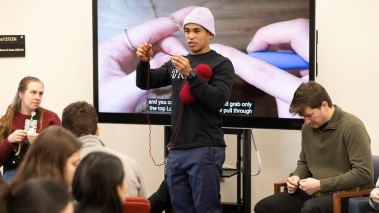Chances are, some or all of your education is now happening online. Now let us help you get on the ball.
With the COVID-19 pandemic causing a surge in online education, students have had to adapt quickly from traditional classrooms to new ways of learning. We’ll answer some of the more common questions students have about distance learning and give some tips to students learning online.
What is an online classroom?
An online classroom is one in which at least a portion of the learning takes place asynchronously (without real-time interaction) through learning management system technology. Online learning can be fully asynchronous, blended asynchronous (meetings happen in a physical or virtual space) or blended synchronous (mostly virtual, but some instruction is provided through technology).
Remote learning is different than online learning. It is 100% synchronous (students and instructors taking part in the learning process at the same time) and usually occurs due to emergency circumstances that make it difficult for classes to gather in person.
How do online classes work?
Online classes have students learn through weekly instructions that are entered into a learning management system by the teacher. Instructions include readings, interactive activities between the students and their classmates, as well as assignments, student assessments and due dates.
Though students often learn on their own time, “Online courses should not be lonely experiences,” says Angela Velez-Solic, PhD, director of the Center for Teaching Excellence and Innovation at Rush University. “Quality online learning is interactive and engaging with a very involved faculty member. There are due dates, which means deadline and participation expectations.”
What are the differences between online and traditional education?
Online education is vastly different than traditional education. In traditional education, students might be able to attend a class and perform well despite little interaction with the teacher or other students. That is not the case with online education.
Teachers who are trained to teach online classes are taught that lectures shouldn’t be the focus. Instead, online education teachers rely heavily on student involvement that results from carefully designed learning modules. If lectures are given, they are generally broken up into shorter sessions.
"It’s like comparing soccer and baseball," Velez-Solic says of the comparison between an online and a traditional classroom. "They’re both sports and they have rules and scores, but that’s about as far as the similarities go."
Can online learning be as effective as the traditional classroom?
Not only can online learning be just as effective as a traditional classroom, research shows it can actually be more effective. Many people assume online courses essentially teach themselves, with teachers serving only to grade the student and provide feedback. In high quality online courses, though, all students have a voice and participate, which leads to an enriching learning experience.
What are some tips for online classes?
- Manage stress levels: We’re going through a period of uncertainty and adjustment as we move toward more online learning. So make sure to take breaks, get some fresh air and make time for activities that are calming.
- Limit distractions: You may want to limit the amount of social media you consume, and turn your phone’s ringer to silent or vibrate and turn off notifications on all of your devices. If you live with others, put a note on your door to let people know that you’re focusing on school work. Stay organized to keep physical clutter from distracting you.
- Accept the situation: Many of us are now learning online due to circumstances that are mostly out of our control. Acknowledging that will help you adjust your mindset and expectations, which will ease your mind and set you up for academic success.
- Adjust your learning environment: Create a study space that fits your needs. If you need a quiet environment, make sure you’re in a quiet space. If you prefer noise, introduce background music. Get a comfortable place to sit (not your bed, if possible). Think about getting an exercise ball as your seat if you are someone who needs movement.
- Manage your time: Prioritize your activities (school work and research, volunteering, and extracurricular activities). Create a schedule and set reminders to help your time management efforts and ensure you are setting aside time to study. “Research is important. Volunteering is important. But everything can't be the same level of importance,” says Dijana Demirovic, MEd, student support manager at Rush Medical College. “So how do you prioritize? Creating a schedule is really helpful, because it allows you to see how much time you have to devote to extracurricular activities.”
- Check in daily if you can: Logging in every day can help you stay connected. You’ll see whether your teacher has made any changes, such as extending a due date or adding important new information. And if there's a study group discussion post, seeing and responding to the latest updates will keep you engaged.
- Engage with your peers and teachers: Make an effort to connect with your fellow online students and faculty to help build a sense of community and control feelings of isolation. Turning on your camera during meetings for some virtual face-to-face time will help people match your expressions with your tone and the content of your message. That will help people fully understand what you’re trying to say, which will lead to better interactions.
How is Rush University helping their students with the transition to online learning?
With some of the top online programs in the country, Rush University was already in a good position to adapt and guide students in traditional programs when online learning became more necessary and widespread. The University quickly developed a self-paced e-learning guide to help students with the transition.
Students can also turn to the Center for Academic Excellence for learning support and the Center for Clinical Wellness for mental health resources as they navigate the shift to online learning.
At Rush Medical College, students receive a weekly logistics email and video to keep them informed about schedules, technology issues and what to expect that week. They provide students many ways to provide feedback — from surveys to open forums — on what is and isn’t working in their experience as an online learner.
“We always make sure to ask students for their feedback,” says Princess Currence, DSW, MSW, director of curriculum and education at Rush Medical College, who managed the college’s conversion to online learning when the COVID-19 pandemic began. “Then we make sure to act on their feedback. We’re always adjusting how we structure our activities so that they help students to be able to not just consume information but also analyze, implement and problem solve to the best of their ability.”






